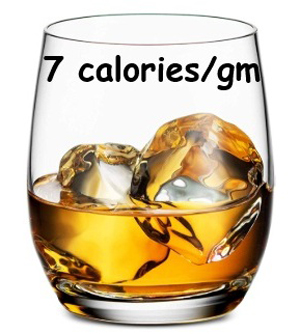Is alcohol a food?
Alcohol is not considered a food in the usual nutritional sense. Food is generally defined as something that provides essential nutrients (carbohydrates, proteins, fats, vitamins, minerals) to support growth, repair, and overall health.
Alcohol (ethanol) does provide calories — about 7 calories per gram — but it offers no essential nutrients, so it is called “empty calories.”
In nutrition science, alcohol is sometimes classified as a macronutrient-like energy source (alongside carbs, fats, and proteins) but not as a nutrient because the body does not need it for survival.

So while alcohol can provide energy, it is not considered a true food — and excessive intake can harm health rather than nourish the body.
Instead, alcoholic drinks can contribute a surprising amount of unnecessary calories to your diet. Many mixers commonly added to alcoholic drinks, such as soda, fruit juice, or cream, can further increase the calorie count. Added sugars also come in the form of simple syrup or sweet liqueurs, which are frequent ingredients in cocktails. Even a seemingly harmless beer or glass of wine typically contains around 100 to 150 calories. Cocktails, especially those with sugary mixers or creamy bases, can range anywhere from 100 to nearly 500 calories per serving.
Consuming several drinks over the course of an evening can quickly add up to a significant portion of your daily calorie needs. These excess calories can contribute to weight gain over time, especially if you are not adjusting your food intake or increasing your physical activity to compensate.
If you choose to drink alcohol, it is important to include those calories in your overall meal planning. By being mindful of your drink choices and portion sizes, you can enjoy alcohol occasionally without letting it derail your health goals.
Are there any beneificial effects of alcohol on health?
Alcohol can have some potential health benefits, but only when consumed in very small or moderate amounts — and these benefits do not apply to everyone. For many people, the risks of drinking outweigh the benefits.
✅ Heart Health (in moderation) – Some studies suggest that light to moderate drinking (e.g., a small glass of wine a few times a week) may increase HDL (“good”) cholesterol and reduce the risk of coronary heart disease.
✅ Antioxidants – Red wine contains polyphenolic antioxidants like resveratrol, which may help protect blood vessels and reduce inflammation.
✅ Social and Psychological Benefits – Light drinking in social settings can promote relaxation, reduce social anxiety, and strengthen social bonds, which may indirectly benefit mental well-being.
However, no amount of alcohol is completely risk-free, Benefits are not a reason to start drinking if you do not already — similar benefits for heart health can be achieved through exercise, a healthy diet, and not smoking.
Even small amounts can increase cancer risk, liver strain, and other health issues in some individuals.
Bottom line:
If you do not drink, there is no health reason to start. If you drink heavily, work on reducing your intake! Medical Disclaimer.
Read further on:
≺≺ What foods should people with high blood pressure avoid?
≺≺ How can I reduce the risk of cancer-causing chemicals when cooking or grilling meat?
≺≺ How toxic are the nitrites used in curing processed meats?
≺≺ What are the worst meats for accumulating cancer-causing chemicals during cooking?
≺≺ How are artificial sweeteners made?
≺≺ Can Physical Activity Help Improve My Arthritis?
≺≺ How common is thumb pain from too much texting?
≺≺ What health problems are linked to consuming corn syrup?
≺≺ What happens to my blood vessels when I gain weight?
≺≺ What are the four enemies of blood sugar?
≺≺ What type of exercise is best for lowering my blood sugar?
≺≺ What impact can sitting for long periods have on my health?
≺≺ Does my social circle impact my weight?
≺≺ How toxic are the nitrites used in curing processed meats?
≺≺ How can I reduce the risk of cancer-causing chemicals when cooking or grilling meat?
≺≺ What foods can lower prostate cancer risk?
≻≻ Watch this page for more such informative articles on Health, Nutrition, and Wellness.
≻≻-Back to Home page.
Further reading (External Links opens in new window):
≺≺- Harvard Health Publishing- Could what we eat improve our sleep?.
≺≺- Cleveland Clinic- Foods to increase serotonin levels.

